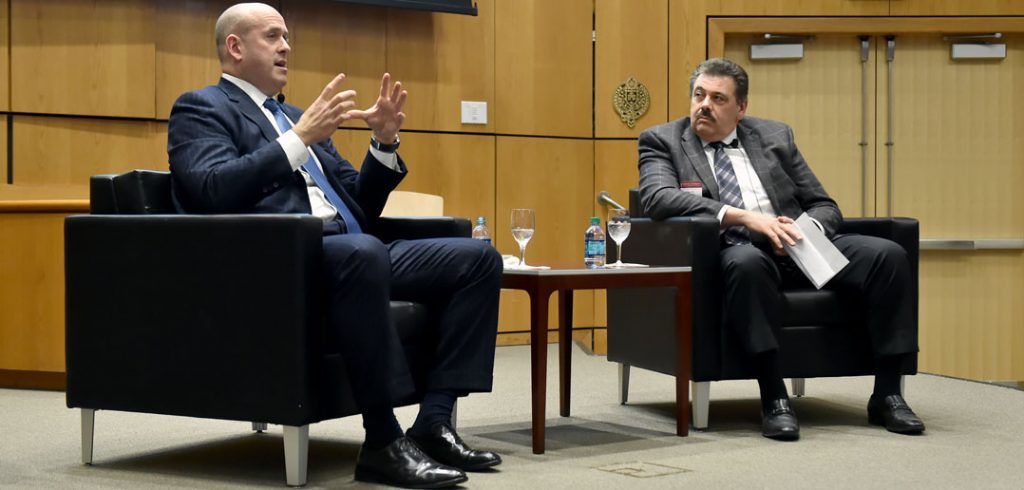If you asked Harvey M. Schwartz, president and co-chief operating officer of The Goldman Sachs Group, Inc., what career he wanted to pursue after graduating from high school, working on Wall Street would probably not have been on his list.
“Like a lot of kids, I had challenges when I was younger,” said Schwartz at a March 13 talk sponsored by the Gabelli School of Business’ Fordham Wall Street Council. “My mother died from cancer when I was 14 years old, and to say that I didn’t do well in high school would have been an exceptional understatement.”
Following high school, Schwartz worked at a local gym where a Rutgers alumna was a client. Every time she’d come in, she would encourage him to apply to the university, he said. Though he didn’t consider himself a good student, he applied and was rejected.
But Schwartz said the alumna asked Rutgers to “take a fresh look” at him. After interviewing Schwartz in person, they later accepted him, he said.
“I think that I can mark pretty much every critical part of my career, where someone was willing to invest in me, spend time with me, and take a chance,” said Schwartz, a native of Morris Township, New Jersey.
In college, he developed a love of economics, which later sparked his interest in finance.
“I realized along the way that I liked incremental challenges,” he said. “But really the takeaway should be that if you work hard, people will invest in you.”
Prior to joining Goldman Sachs in 1997, Schwartz spent most of his career at Citicorp. He entered Wall Street in 1987 “just in time to witness the Dow Jones Industrial Average plunge 22.6 percent,” according to a 2012 profile in Bloomberg News.
“Innovation is present in financial services,” he said. “I think that if you have an interest in solving complex problems for clients or specific areas of markets, there is a unique way to participate.”
As an executive in an environment driven by excellence, Schwartz said the firm attracts high-quality candidates from around the country who possess exceptional analytical, financial reporting, and problem-solving skills. But talent has no boundaries, he said. When he interviews candidates for positions at Goldman Sachs, he takes a unique approach.
“For me, the interview is more about problem-solving skills and how people handle stress,” said Schwartz. “I’ll say, ‘Tell me about yourself,’ which is a good ice breaker. “Then I’ll ask them to sell me something that is on my desk.”
For Schwartz, routines are fundamental in the financial sector.
“I’m very routine centric and I’m very fanatical about my calendar,” he said, adding that he likes to “create calm around unreliability.”
Schwartz said aspiring finance professionals should aim to discover careers in the sector that will give them the most fulfillment.
“You want to feel good when you walk into whatever firm you walk into,” he said. “Is it a place where you feel comfortable and see yourself being challenged?”
Having recently announced his retirement from Goldman Sachs in April, Schwartz said his experience at the firm was beyond what he could imagine.
“When you leave a firm like Goldman Sachs and you’re as fortunate as I am to experience that, the thing that you miss are the people and the shared experience,” he said.

